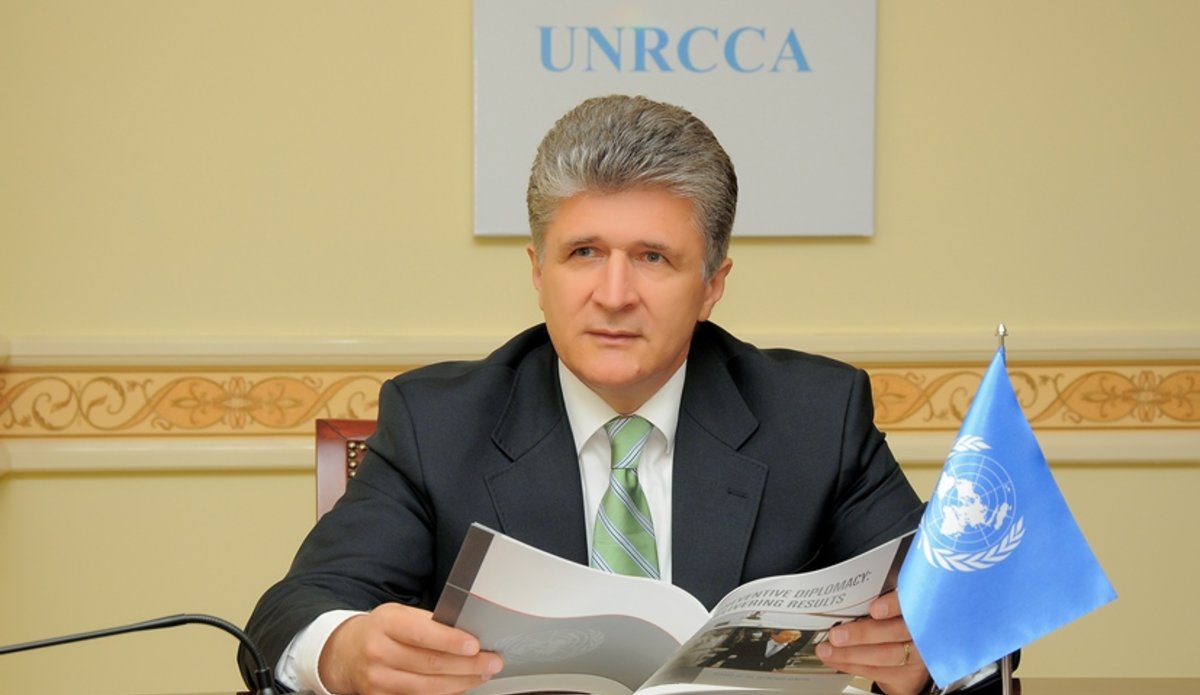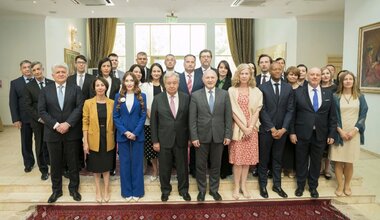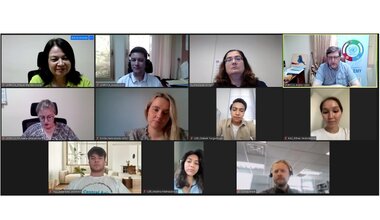Welcome address of SRSG Miroslav Jenča at the International Conference "Turkmenistan-UN: 20 years of Cooperation": "Five Years of Preventive Diplomacy in Central Asia: Achievements and Prospects"
ASHGABAT, Turkmenistan
Your Excellency,
Ladies and gentlemen!
On behalf of the Secretary-General of the United Nations, Mr. Ban Ki-moon, I have the honor to welcome the participants of the conference on the 20th anniversary of Turkmenistan's entry to the UN.
Today, looking at the path we walked along, it becomes evident that the event that had taken place 20 years ago had a decisive importance for the development of Turkmenistan as an independent state and an equal participant in international relations.
However, this fact was important not only for Turkmenistan, but also for the international community as a whole. UN member states acquired another partner in the promotion of international peace and security, which from the beginning became very actively involved in the activities of the organization. Various initiatives put forward by the Turkmen side from the rostrum of the UN headquarters in New York are the best example of that.
Further to these initiatives, a number of high-level events are scheduled this year in Ashgabat in cooperation with the UN agencies, such as a conference on refugees and internally displaced persons (together with UNHCR) and the Forum for Security in Central Asia and the Caspian Sea region (with support of UNRCCA). We believe that the implementation of these plans with the support of interested states would promote peace, mutual understanding and cooperation in this region so important for global stability.
In practical terms, Turkmenistan immediately after gaining independence, became actively involved in peace processes in Central Asia, providing a platform for inter-Tajik negotiations. Currently, the Turkmen side is working closely with the UN in order to mobilize the international community to assist neighboring Afghanistan.
Last year alone, the government of Turkmenistan jointly with UNECE, UN ESCAP and UNRCCA organized in Ashgabat two SPECA forums in support of reconstruction process in Afghanistan. The Centre also maintains close contacts with the United Nations Assistance Mission in Afghanistan (UNAMA) in order to stabilize Afghanistan and strengthen regional security. The UN highly appreciates the assistance provided by Turkmenistan to Afghanistan on a bilateral basis.
Ladies and Gentlemen,
For solving problems related to peace and security in Central Asia, and the world in general, nowadays more attention is paid to methods of preventive diplomacy, which aims to prevent conflicts at the earliest possible stages.
In this regard, I would like to point out that the government of Turkmenistan has always been an advocate of preventive diplomacy in solving complex problems in Central Asia, such as the common use of trans-boundary water resources as well as countering regional challenges stemming from the smuggling of drugs and weapons, religious extremism and terrorism. The proposals put forward by Turkmenistan on preventing conflict and peaceful resolution of disputes correlate with the challenges the UN Secretary-General Ban Ki-moon had identified as priorities for his second term in office. It particularly applies to the prevention of conflicts and disasters as well as creating a safer and more prosperous world.
In light of the above, it is not a coincidence that Ashgabat became the seat of the United Nations Regional Centre for Preventive Diplomacy for Central Asia - a fundamentally new organization, which seeks to prevent conflict and help resolve the most pressing regional problems.
UNRCCA is a UN special political mission established in December 2007 in Ashgabat on the initiative of the five Central Asian states. Our main aim is to mobilize joint efforts to respond to existing and potential threats to peace and stability in the region, as well as to strengthen the security partnership between the governments of Central Asia, regional and international organizations. The Center operates on the basis of the mandate stipulated in the Letter of the UN Secretary-General and specified in the Center's Programme of Action for 2012-2014.
This year in December, our Center will celebrate its 5th anniversary. It's a good occasion to draw some preliminary results of our activities.
Over the past years, the Regional Center has established itself as a reliable partner and effective tool for strengthening peace and regional cooperation. The Center has become a platform for talks on various issues related to peace and stability in Central Asia.
The Centre acted in this capacity, together with the UN Counter-Terrorism Implementation Task Force (CTITF) and the EU, in order to carry out the project aimed at the implementation in Central Asia of the UN Global Counter-Terrorism Strategy. The project culminated with the high-level meeting in Ashgabat on 30 November 2011, organized jointly by the Government of Turkmenistan, the EU, CTITF and UNRCCA, which adopted the Ashgabat Final Declaration and the Joint Plan of Action to implement the UN Global Counter-Terrorism Strategy. In the near future we also plan to hold a meeting with regional organizations to discuss the above-mentioned documents. The Center is committed to step up efforts in this direction, particularly regarding cooperation with the countries of the region for the implement the Plan of Action.
Another priority line of the Centre is assistance to problem solving related to the management of common natural resources in Central Asia. In this area, the Center actively collaborates with the Executive Committee of the International Fund for Saving the Aral Sea (IFAS), with which the UN signed a Memorandum of Understanding in Ashgabat in 2010. In accordance with the Memorandum, it is planned to develop cooperation aimed at strengthening regional cooperation, improve the ecological and socio-economic situation in the Aral Sea basin, taking into account the interests of all states in the region.
Currently, the Regional Centre has focused on the development of Early Warning system on Potential Transboundary Water Problem Situations. In February this year under the auspices of the IFAS a trial issue of the bulletin on early warning was released, which contains a number of agreed indicators of potential problems in the management of transboundary water and energy resources. After the final concurrence for bulletin format it is planned to release such a bulletin on a regular basis. In a series of seminars organized by UNRCCA, representatives of relevant national institutions have been able to get acquainted with best practices of international experts and international practices in this area, as well as with international legal instruments in the management of transboundary water resources.
During the past five years the preventive activities of the Centre have found expression in the crisis in Kyrgyzstan in 2010. To prevent the escalation of violence, President of the Center widely used good offices and mediation while meeting with the leaders of Kyrgyzstan, political parties, civil society organizations and representatives of national communities. Centre carried out the overall political leadership in coordinating the humanitarian efforts of UN agencies in Kyrgyzstan, as a result of which thousands of people injured during the riots have been given help. In the sequel, the Centre played an organizing role in mobilizing the UN efforts in support of the formation of legitimate government through democratic elections in Kyrgyzstan. A number of projects for peace promotion in Kyrgyzstan are being realized in the framework of peace-building strategy, developed jointly by UN agencies, the Regional Centre and the Kyrgyz authorities which are funded by the UN Peacebuilding Fund.
Another important activity of the Centre is to conduct training and seminars to improve professional qualification of young diplomats and public service specialists in Central Asia. These seminars provide an opportunity for young public servants to share experiences and enhance their skills on specific issues of international relations and international law.
The Regional Center also provides a platform for meetings between representatives of the regional strategic studies institutes, academic and expert circles of Central Asian states, as well as international experts to discuss various aspects of development in Central Asia. In 2009 and 2010 UNRCCA organized two similar workshops in Ashgabat. I have just returned from Tashkent, where we held a third seminar on "Sustainable development - a key factor for stability and peace in Central Asia", during which a thorough exchange of views on the impact of social and economic processes on the overall situation in Central Asia had taken place.
Dear participants of the conference,
I have mentioned only the main aspects of our cooperation with regional states, international organizations, donors and other partners in conflict prevention activities and ensuring sustainable peace in Central Asia. During the annual meetings of the Ministers of Foreign Affairs of the Central Asian countries we discuss these issues in more details, the results of these meetings are reflected in our programs.
The countries of the region are facing complex challenges. The problems associated with drug trafficking, terrorism, extremism, a possible increased risk for regional security after the withdrawal of NATO troops from Afghanistan in 2014, urgently require a coherent approach and considerable joint efforts of all states in the region. Regional Center within its mandate, is ready to continue to assist the Central Asian countries in this regard.
At the same time, a brief overview of what we have already done together with our partners for these five years is encouraging and let us hope that the achieved results lay a good groundwork for the future. As the UN Secretary General Mr. Ban Ki-moon has recently stated, we have one goal - "to create a safer, more sustainable and more equitable future, a future that we want."
In conclusion, let me once again congratulate the participants of this conference, leaders of Turkmenistan and in his person all the people of Turkmenistan on the occasion of the 20th anniversary of Turkmenistan's accession to the UN, and to wish us all success in ensuring peace and stability in the region and around the world.
Thank you.
 UN
UN





